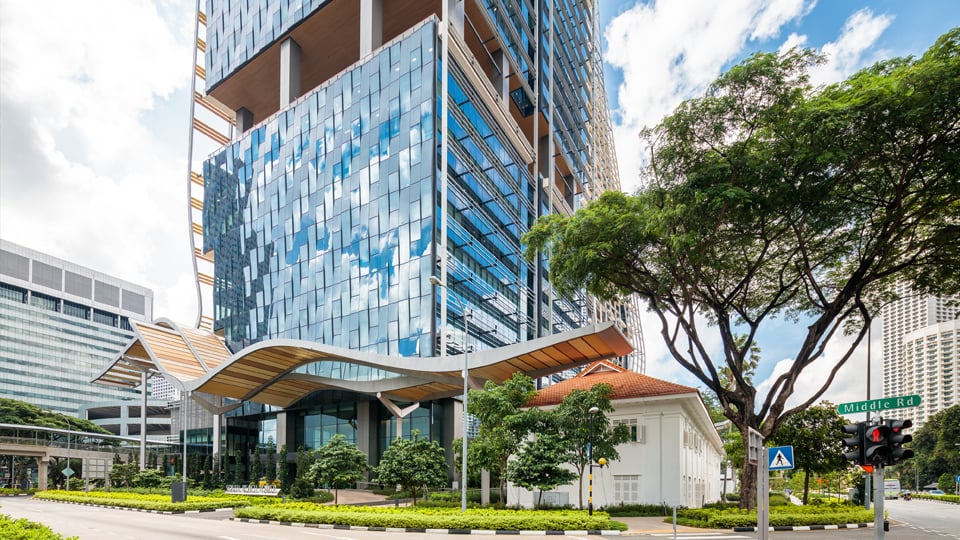Iconic eco-quarter South Beach is about to get even greener. South Beach Tower, its office component, has unveiled a new innovative proposal which will provide better thermal comfort and air quality for its occupants.
The proposal will holistically integrate three solutions to enhance the overall energy efficiency of its air conditioning system, enabling it to achieve 75% energy efficiency improvement (from 2005 levels). The solutions are developed in collaboration with four other partners – led by sustainability consultancy GreenA Consultants and three solution providers, Akila, Resync, and ebm-papst.
This ambitious energy retrofit project is also the first recipient of a S$1.6 million grant under the Building and Construction Authority (BCA) Green Buildings Innovation Cluster (GBIC) 2.0 Programme. The BCA GBIC 2.0 programme seeks novel solutions with significant energy savings without compromising thermal comfort and indoor air quality. With the energy retrofit for South Beach Tower, it aims to achieve a 75% energy savings compared to the 2005 baseline, surpassing the Super Low Energy (SLE) standards and setting a new benchmark for existing buildings.
The proposed initiatives are part of South Beach’s sustainability goals to achieve the BCA Green Mark 2021 certification and is aligned with the Singapore Green Building Masterplan. The total cost of these initiatives is S$3.9 million, which is offset by BCA’s S$1.6 million grant. The targeted energy savings is approximately S$411,000 per year with a payback period of around 5.6 years. In addition, the facilities management team will also be upskilled to handle these new AI-based technologies.
To realise Singapore’s net-zero goals, the collective efforts of all, from developers to building users, is vital. At the BCA Awards Ceremony of the International Built Environment Week (IBEW) 2024 on 6 September, Ms Indranee Rajah, Minister, Prime Minister’s Office, Second Minister for Finance and Second Minister for National Development of Singapore, acknowledged the efforts by some firms, including City Developments Limited (CDL), who have started to take a value-chain approach to collectively advance the sustainability agenda.
Minister Indranee said, "Not only has CDL developed its roadmap to achieve net-zero emissions for its assets by 2030, it has also been bringing partners together to drive sustainability through various initiatives. Under a Green Buildings Innovation Cluster demonstration project, CDL and its joint venture partner IOI Properties will partner local startups to pilot AI-enabled solutions to help the South Beach Tower office building achieve 75% energy efficiency improvement from 2005 levels."
Ms Samantha Tan, General Manager, South Beach Consortium Pte Ltd, said, “By pioneering these latest green building innovations, South Beach seeks to set new standards in building sustainability and inspire other building owners to embrace similar technologies to create a healthier, more energy-efficient environment for its occupants.”
Mr Tan Chee Kiat, Deputy Chief Executive Officer (Industry Development), BCA, said, “Building on the success of GBIC demonstration projects, we believe that energy efficiency boundaries can be pushed further by leveraging artificial intelligence and Internet of Things. The GBIC-Demonstration project on South Beach Tower Office aims to demonstrate how this could help to address the challenges of energy consumption patterns and achieve energy optimisation while delivering thermal comfort. Together with the earlier two projects awarded by BCA under the GBIC 2.0 Research and Innovation Programme, this would put us in a step closer to achieving the 80% energy efficiency improvement (from 2005 levels) target for best-in-class green buildings by 2030, under the Singapore Green Building Masterplan.”
Developed in collaboration with lead sustainability innovation consultants, South Beach’s “Machine Learning-Driven Operation” proposal comprises three solutions to enhance the energy efficiency of its air conditioning system.
Intelligent Building Automation and Smart Controls: Machine Learning Technology for Efficient and Automated Airside Cooling
- By using artificial intelligence and machine learning technology to analyse the data and predict cooling demands, the building’s air conditioning system delivers efficient and precise cooling to the building’s occupants.
- This is achieved with the use of sensors to detect the trending air quality, occupancy and outdoor weather data, minimising any overcooling provision and results in energy savings.
- For example, when occupants return to their offices from the outdoors, the air conditioning system delivers increased cooling based on the occupancy patterns and outdoor weather temperature, allowing occupants to enjoy better thermal comfort and air quality.
- Once the occupants have settled down, the air conditioning system will detect the reduced activity level and lowers its cooling provisions appropriately. This allows the air conditioning system to conserve energy without comprising on the thermal comfort of the occupants.
Lightweight High Efficiency EC Fans for Air Handling Units
- The electronically commutated (EC) fans comprise a new RadiPac C, a compositive lightweight material that replaces the fan’s metal impeller. Due to its lightweight properties, the new RadiPac C alloy fan impeller is more energy efficient and has less embodied carbon as compared to metal impeller.
Digital Twin Technology with AI and Machine Learning Capabilities for Building Operations
- A virtual replica for South Beach Tower is constructed using digital twin technology. This replica uses AI and machine learning technology to convert the building’s temperature and humidity readings into actual cooling demand in real time with the help of thermodynamic models.
- The system delivers the exact amount of cooling based on this information, preventing any unnecessary over-supply and results in energy conservation.

